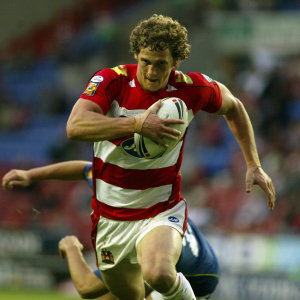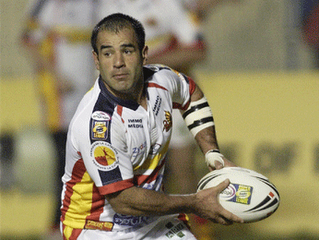
For the second year in succession, Great Britain are the first side to bow out of the Gillette
Tri-Nations after yet another year of failure on the International stage.
Saturday's 33-10 defeat in Brisbane highlighted how far ahead the Australians are and showed just how little the British game has actually progressed in comparison.
The debates raged long into the night at
Suncorp Stadium as to why the Lions were once again shown to be toothless. Scheduling, injuries, travelling, team selection and basic abilities were raised as factors in the Brisbane and Wellington defeats but what reasons actually hold any water?
Problem 1: The Talent Pool.
Phil Clarke, the recently resigned Great Britain team manager raised a point in Sky Sports' after match analysis which I felt was extremely pertinent:
It's no good saying that "we tried hard". Twenty years ago, Brian Noble "tried hard" against Australia and lost. Today, Great Britain "tried hard" and lost again. That tells you that the problem is not one of effort, but one of ability.
You just have to look at the two squads to see where Clarke is coming from. The likes of Jamie Peacock, Paul
Wellens and Gareth Ellis could make a strong claim to be amongst the best players in the world but once you look past that, you start to see where the differences apply.
Once Sean Long departed the Great Britain set-up, not only did he leave the side without a recognised goal-kicker, but he also left the side without an experienced half-back. Both Richard Horne and Rob Burrow, as talented as they undoubtedly are, are not battle-hardened on the International stage. Asking an untested partnership in McGuire and Horne to go into a must-win game against the combination of Thurston and
Lockyer is the personification of Rugby League suicide.
The talent pool in Britain is light years behind the
NRL set-up. You could take any one player from that Australian side and come up with a raft of players suitable to fill the void.
In the full-back position for instance, aside from Paul
Wellens, there was only the injured Richard
Mathers who could make a realistic claim for a test jersey. The Australians on the other hand, have
Karmichael Hunt, Billy Slater, Anthony
Minichello and, if push comes to shove, Darren
Lockyer.
It's the same story at scrum half. North Queensland's Jonathon Thurston became the Kangaroo's natural successor to Andrew Johns but even if he had he failed to make the grade, the likes of Matt
Orford, Brett Finch, Brett
Kimmorley or Scott Prince would no doubt have been able to fill the void.
Part of that problem has been fuelled by Brian Noble's decisions to persist with the tried and failed players instead of blooding young, upcoming players in warm-up and exhibition games but the problems also lie at home. The pressures imposed by the threat of automatic relegation coupled clubs' insistence on importing overseas talent prevents the talent pool from growing and forces players from the Super League academies into the National Leagues, where they then lose the benefit of full-time coaching.
This brings me onto the next point;
Problem 2: Maros KolpakNever again will a Slovakian handball player from the German second division have such an impact on British sport.
The '
Kolpak ruling' in 2003 opened the floodgates for players from Tonga, Samoa,
Papua New Guinea, Fiji and South Africa (amongst other nations) to ply their trade in Super League without being subject to the overseas quota.
Just as an EU resident is able to work freely in the EU, so now is a member of a state which has a trading agreement with the EU.

Whilst this has meant the Super League fans have been thrilled by the skills of David
Solomona, the power of Lesley
Vainikolo and the personality and flair of Maurie
Fa'asavalu, the quality of the imports has at times left much to be desired.
The fear for fans and supporters of Great Britain is that the overseas player are driving talent away from the Super League. In the round 27 clash between Bradford and Wakefield, just 16 of the 36 players on show were available for the watching Brain Noble to select. Such statistics show just how slim the talent pool is and it soon becomes little surprise why injuries and player withdrawals spell disaster of a touring GB side.
Rugby League isn't the only sport that has suffered from this. The same rules apply in Rugby Union but that too is to the
detriment of Rugby League. Already we see the
RFU, struggling to maintain a competitive England side with what is currently has, "importing" British talent from the 13-man game. Andy Farrell may not have been such a loss given his age, but perhaps the same could not be said for Chev Walker and Karl Pryce.
Problem 3: SchedulingFor the past three years, whilst Australia and New Zealand get two week-long breaks, Great Britain are asked to play four times in four weeks (five times had the made the final).
In such a physical and intense competition, such a schedule is difficult enough on home soil. On tour however, the problems are multiplied. The GB players are typically used to one hour drives across the M62 for away games and are, at worst, asked to endure a 90 minute flight to the south of France. To then ask those players to travel to the other side of the globe and then take no less than six domestic flights between venues is putting undue pressure on already overworked players.
The situation worsens when you factor in the number of games the players are asked to play domestically.
Any St
Helens player in the GB squad that was lucky enough to play every game for his club would have played in 28 Super League games (two of which were in France), Five Challenge Cup games, including the final and two play-off fixtures (although this could possibly have been four had they finished lower in the table). That amounts to 35 domestic games in total from a possible 37 (excluding friendlies). In addition, add four
Tri Nations matches and a mid-season international to give you 40 games in just ten months. Such a season is far from workable in such a physically intense sport and if GB are have the opportunity to prepare for success and prevent such a difficult international
itinerary from
occurring again, the the
RFL needs to ensure that the number of Super League fixtures are cut.
Problem 4: Team SelectionA stand-off on the wing, a second row in the front row, a complete liability at loose forward, one of our most creative players sat on the couch at home and Sean Long at scrum half.
This years Great Britain team selection, like every other year, has been a mismatch of players picked on reputation being played out of position just so that they can all be
accommodated.

Some selections paid off in the sense that they were one of few
positives to emerge. James Roby and Gareth Hock played superbly and certainly staked their claim to be Lions regulars in the future.
But there were plenty of negatives. Leon Pryce was taken away from the area of the field where he is dangerous. He is a competent winger, but his talents are wasted there. The selection of Martin
Gleeson was questionable to begin with but then his recall in place of the inform Kirk
Yeaman suggested that Brian Noble had lost the plot and his persistence handing Sean
O'Loughlin the number thirteen shirt showed quite simply that
Nobby was indeed nuts.
Elsewhere, Andy Coley must have been wondering what he'd done wrong, after seeing Stuart
Fielden keep him out of the side and Rob Burrow will also be questioning if he'll ever don a GB shirt in a test arena.
For many years now, we're constantly being told that we are catching up to the Australians. Those at Red Hall have been quick to point to British performances against
NRL clubs in a
pre-season friendly as an indicator that we are starting to get the better of the
Roo's.
The results speak for themselves though and the past three decades have proved that the Australians are better in every facet of the game. Their infrastructures are better, their talent pool is better, their club game is better and their organisation is better.
Changes need to be made, not just to GB but to the British game in it's
entirety, otherwise the
Kangaroo's will continue to be leaps and bounds ahead of some very poor competition.
 Deep in the bowels of Red Hall, the Rugby Football League super computer has finally finished compilling it's 'randomly' drawn fixture list and the The 2007 Super League fixtures have finally been released to the great unwashed.
Deep in the bowels of Red Hall, the Rugby Football League super computer has finally finished compilling it's 'randomly' drawn fixture list and the The 2007 Super League fixtures have finally been released to the great unwashed.














